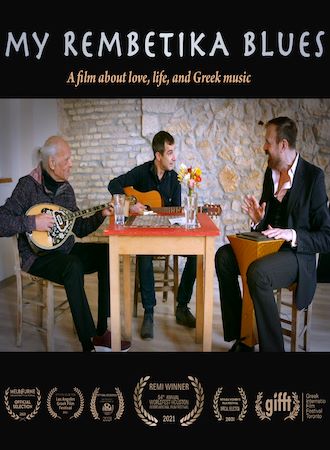
My Rembetika Blues 2021
Distributed by Documentary Educational Resources, 108 Water Street, 5A, Watertown, MA 02472; 617-926-0491
Produced by Mary Zournazi and Tom Zubrycki
Directed by Mary Zournazi
Streaming, 83 mins
College - General Adult
Folk Music; Immigration; Music
Date Entered: 01/27/2023
Reviewed by Linda Dempf, Music and Media Librarian, The College of New JerseyFilmmaker Mary Zournazi first heard Rembetika, a form of Greek-Turkish urban popular music, in Costas Ferris’ film Rembetika, and wondered why a music she had never heard before was so deeply moving and so strangely familiar. My Rembetika Blues explores the idea of shared memory, as the filmmaker documents her journey in search of her family origins through Turkey, Greece, and Egypt, while weaving the story of Rembetika into her narrative, which she characterizes as the “music that calls me home.”
Mary Zournazi traces her family origins to her grandmother from Smyrna (now Izmir, Turkey), at the end of the Greco-Turkish War, when the Great Fire of 1922 destroyed the Greek and Armenian neighborhoods of the city, causing a mass exodus of “people, song, and music tradition.” Mary’s grandmother was among the million refugees forced out of Smyrna. Rembetika would never have taken hold without this mass movement of refugees, according to scholar Gail Holst who was interviewed throughout the film. Rembetika is music of migration, urban music of the working class, with gritty lyrics about hardship, love, heartbreak, and yearning, and it does not shy away from realities like drug use and violence. Throughout the film, we are given a sense of the tradition of Rembetika through older footage, such as Marika Papagika’s spare and haunting rendition of “Smyrneiko Minore.” Contemporary musicians also discuss the universality of Rembetika, how it has affected their own music, and how a shared music is transmitted over time and space. We hear music and commentary from the band Tatavla Keyfi, from Stelios Vamvakoris, whose father Markos was one of the early founders and proponents of Rembetika, as well as the Greek hip hop artist Negros Tou Maria, who incorporates Rembetika into his music.
The pain of migration and refugee status runs throughout the film. Mary’s mother was orphaned in Egypt, and we learn that she was denied entrance to a Greek orphanage, due to the family's refugee status, and Mary found no record of her mother’s time in Egypt. Later, during Nassar’s rule, her parents were political refugees, forced out of Egypt, and not wanted by Greece either, migrating again to Australia. Weaving this personal story of immigration, music, migration, and culture, the filmmaker searches for identity and belonging, while responding to the music that embodied the memories of her ancestors. This is a very accessible film, and would appeal to a general audience, as well as support classes in music, history, and migration.
Awards:Gold Remi Documentary Award, World Fest Houston Int'l Film Festival, Melbourne, 2021; Excellence in Filmmaking Award, Spotlight Film Awards, 2021; Platinum Award, Women’s International Film Awards, 2021; Best Documentary, Feature Film Competition – World of Film Int'l Film Festival, Glasgow, 2021
Published and licensed under the Creative Commons Attribution 4.0 license. Anyone can use these reviews, so long as they comply with the terms of the license.